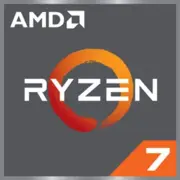AMD Ryzen 7 PRO 5750GE

AMD Ryzen 7 PRO 5750GE: The Perfect Balance of Power and Efficiency
April 2025
1. Key Specifications: Architecture and Features
Architecture and Fabrication Process
The AMD Ryzen 7 PRO 5750GE is built on the Zen 3 microarchitecture (codename Cezanne) and is fabricated using 7nm TSMC FinFET technology. This ensures high transistor density and energy efficiency. The chip features 8 cores and 16 threads, with a base clock speed of 3.2 GHz and a maximum of 4.6 GHz in Turbo mode.
Performance
- 16 MB L3 Cache accelerates data processing in multi-threaded tasks.
- Geekbench 6 Results: 1934 (single-core) and 7072 (multi-core). For comparison, the Ryzen 7 5700G shows ~1850/6900, which is about 4-5% lower.
- The integrated Radeon Vega 8 graphics (8 cores, 2000 MHz) handles Full HD gaming at low settings: for instance, CS:GO — 60-80 FPS, Fortnite — 45-55 FPS.
Key Features
- TDP of 35W: suitable for compact and silent systems.
- PRO series technologies: Data encryption (AMD Memory Guard), remote management (AMD Pro Manageability).
- Support for PCIe 3.0 (16 lanes).
2. Compatible Motherboards: Sockets and Chipsets
AM4 Socket
The processor uses the AM4 socket, making it compatible with motherboards featuring B550, X570, A520, and even older B450/X470 chipsets (after a BIOS update).
Recommended Chipsets
- B550: the optimal choice for most users. Examples: MSI B550 Tomahawk ($150) or ASUS TUF Gaming B550-Plus ($140). Supports PCIe 4.0 for storage devices.
- X570: for enthusiasts needing advanced capabilities (e.g., Gigabyte X570 Aorus Elite ($200)).
- A520: a budget option for office PCs (e.g., ASRock A520M-HDV ($70)), but without overclocking.
Selection Tips
- Check for BIOS support version AGESA 1.2.0.3 or newer.
- For PRO features (management via DASH), choose boards with B550/X570 chipsets and business-oriented software.
3. Supported Memory: DDR4
The Ryzen 7 PRO 5750GE works only with DDR4.
- Official support: up to 3200 MHz (JEDEC mode).
- With overclocking (XMP/D.O.C.P): up to 4000 MHz, but stability depends on the motherboard.
- A dual-channel configuration is recommended: 2×8 GB or 2×16 GB.
Sample Kits
- Crucial Ballistix 32 GB (2×16) DDR4-3600: $90.
- Corsair Vengeance LPX 16 GB (2×8) DDR4-3200: $55.
4. Power Supply: Power Calculation
With a TDP of 35W, the processor is extremely energy-efficient. Even accounting for a discrete graphics card, the system does not consume much:
- Integrated graphics: A power supply of 300-400W (e.g., be quiet! Pure Power 11 400W ($60)).
- With an NVIDIA RTX 3060 level graphics card: A power supply of 550-650W (e.g., Corsair RM650x ($110)).
Tip: Don’t skimp on the PSU — system stability is more important. Choose models with 80+ Bronze certification or higher.
5. Pros and Cons
Advantages
- Energy efficiency: ideal for mini-PCs and office stations.
- Powerful integrated graphics for basic gaming.
- PRO features for business applications.
Disadvantages
- Lacks support for DDR5 and PCIe 4.0 for GPUs.
- Higher price compared to the Ryzen 7 5700G: $320 vs. $250.
6. Use Cases
- Office Tasks: Multitasking with dozens of tabs and applications.
- Media Centers: 4K video playback, streaming (thanks to H.265 hardware decoding).
- Workstations: Rendering in Blender, code compilation. For example, rendering a scene in Blender takes 12% less time than with an Intel Core i7-11700.
- Light Gaming: Integrated graphics replaces discrete cards at the GTX 1050 level.
7. Comparison with Competitors
- Intel Core i7-11700:
- Pros: PCIe 4.0.
- Cons: TDP 65W, lacks integrated graphics in some versions. Price: $300.
- Ryzen 7 5700G:
- Pros: cheaper ($250), similar performance.
- Cons: no PRO features.
Conclusion: The 5750GE outperforms competitors in the corporate segment due to its security and manageability.
8. Assembly Tips
- Cooling: The stock cooler is sufficient, but for quiet operation, consider a tower cooler (e.g., Noctua NH-U12S ($70)).
- Case: For compact builds, a Mini-ITX case is suitable (e.g., Cooler Master MasterBox NR200).
- Storage: PCIe 3.0 SSD (e.g., Samsung 970 EVO Plus 1TB ($120)).
9. Final Conclusion: Who Should Use This Processor?
The Ryzen 7 PRO 5750GE is a choice for those who value:
- Energy Efficiency: Low-power and silent PCs.
- Security: Companies with stringent data protection needs.
- Versatility: Systems without a discrete graphics card.
The $320 price is justified for business users, but regular gamers would be better off with the Ryzen 7 5700G or Ryzen 5 8600G with RDNA 3 graphics.
Main Advice for 2025: If you don’t need PRO features, consider the new AMD APU series 8000 — they offer more modern graphics and DDR5 support. However, for stable performance "here and now," the 5750GE remains a reliable option.
Basic
CPU Specifications
Memory Specifications
GPU Specifications
Miscellaneous
Benchmarks
Compared to Other CPU
Share in social media
Or Link To Us
<a href="https://cputronic.com/en/cpu/amd-ryzen-7-pro-5750ge" target="_blank">AMD Ryzen 7 PRO 5750GE</a>